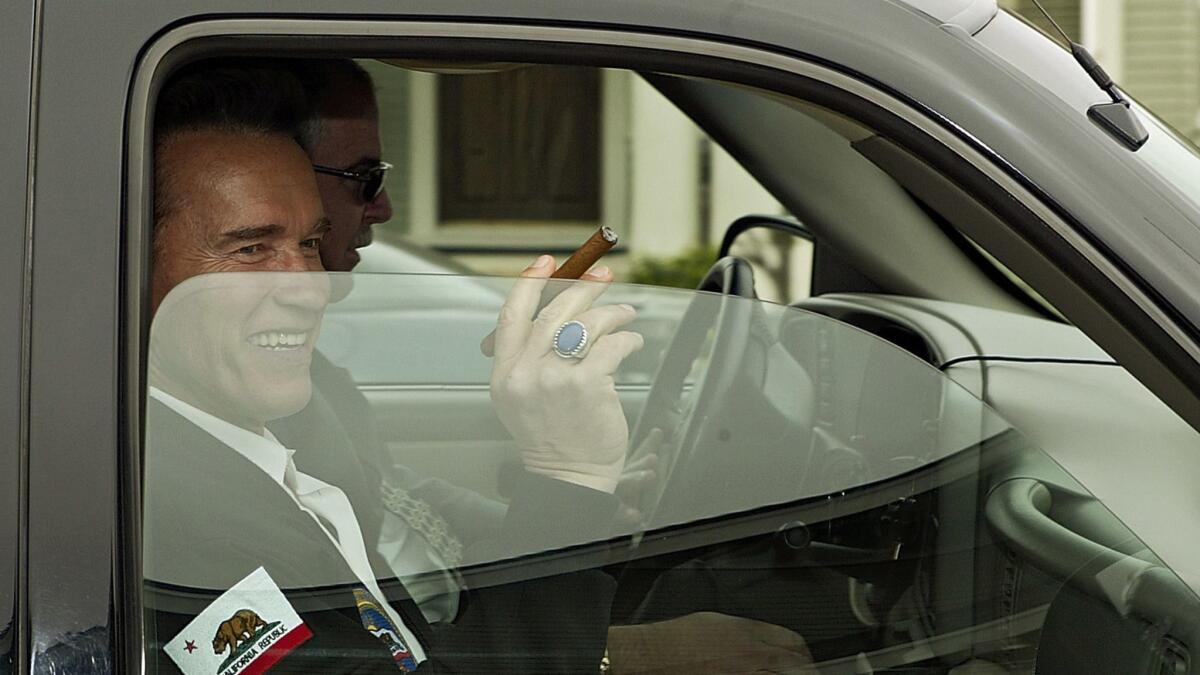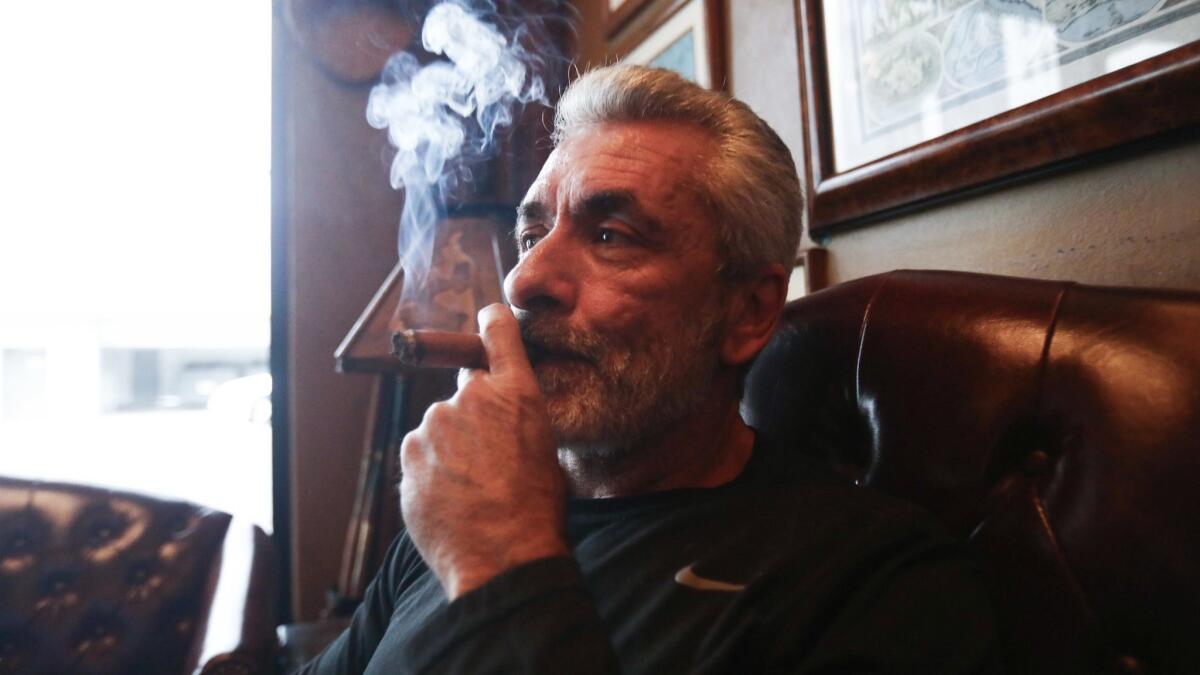Beverly Hills votes to ban tobacco sales, but exempts Schwarzenegger’s favorite cigar club

- Share via
Beverly Hills has long been anything but a smoker’s paradise. The city was the first in California to ban smoking inside restaurants and most public places, back in 1987, and added outdoor venues to the list in 2007.
Now it is poised to enact what officials say is the most stringent tobacco ban in the country, eliminating the sale of virtually all recreational nicotine products — with one very Beverly Hills exception.
Cigarettes are out. Vapes are dead. But for an elite group of aficionados, hundreds of whom swamped committee meetings and wrote the city in protest, cigars will be spared — as long as they’re smoked inside one of three dedicated lounges.
Entreaties have poured in to City Hall from top executives at real estate offices, security firms, talent agencies — and from former Gov. Arnold Schwarzenegger. Nearly all of them are acolytes of the Grand Havana Room on North Canon Drive, a club so exclusive its members need a special key to get in.
“The Grand Havana Room, which I have been a member of since its inception, provides a treasured home away from home,” wrote Schwarzenegger. “It is unthinkable that the city might adopt a policy that would intentionally or unintentionally cause the closure of this character-defining institution.”
Schwarzenegger made clear he supported the ban, which gained near-final approval in a unanimous City Council vote Tuesday night. “I am right there with you,” he wrote. “I agree with your battle to protect people from the dangers of tobacco smoke.”
But when it came to his club, Schwarzenegger wrote, the city should back off.
“I trust that [the city] will recognize the fundamental difference” between clubs like the Grand Havana Room and a gas station selling nicotine pods for e-cigarettes, he wrote.
Others made a similar distinction.
“I know very well the adverse effects on health, that’s why I’m supportive of the general ban,” said Dr. Richard Shemin, chairman of cardiac surgery at UCLA and a vocal advocate for the cigar lounge exemption. “However, I think adults in private clubs who make personal choices should be allowed to do so.”
Officials had expected some pushback over the ordinance, which they say would make Beverly Hills the first city in the United States to enforce a sweeping ban on the sale of all tobacco and nicotine products except those the FDA has approved to help smokers quit.
The list of banned items includes “cigarettes, cigars, cigarillo, pipe tobacco, snuff, chewing tobacco, and smokeless tobacco and any electronic cigarette,” city documents say.
“We expect to hear from tobacco companies,” said Keith Sterling, the city’s public information officer. “Even if this passes, we’ll continue to hear from them.”
They have heard from fans of the cigar lounges.
“There’s certainly a lot of passion from those patrons,” Sterling said. “The council was glad to hear from them.”
By early May, the city had received 170 letters in response to the proposal, 148 of them demanding an exception for cigar lounges. Of these, the vast majority cited the Grand Havana Room, what one insurance industry CEO called “the ‘Cheers’ of Beverly Hills.”
Many wrote that rubbing elbows at the elite club was essential to their high-powered business.
“I learned about a great job opportunity at a private cigar event on the patio of the club — a job that I eventually landed and catapulted my career to what it is now, managing billions of dollars for private equity and venture capital firms in the area,” wrote banker Vik Thadani.
Others said it was a place to escape the glare of fame.
“In our work as a security firm to many high net worth and or high profile clients, we often experience [a] lack of privacy, photographers, autograph seekers,” wrote Israeli security specialist Avi Korein. He described the Grand Havana Room as “an oasis” for the stars he serves.
For some, membership was merely a way to make friends — albeit friends in high places.
“The Grand Havana Room attracts thoughtful people who want to engage in thoughtful conversation,” wrote Rabbi Steven Weil of the Orthodox Union. “It has shaped the film, music, and financial industries.”

Initial outcry led to a significant revision of the original ordinance, which comes just months after a ban on the sale of flavored tobacco.
In Beverly Hills, it is already illegal to smoke most everywhere, including while standing on the sidewalk or walking through a farmers market. The city also prohibits smoking in apartments and condos.
For a time, hotels would have skirted the ban. But that exception was reversed, and then reversed again so that the version of the ordinance voted on Tuesday allows hotels to sell tobacco products — but only through room service.
Yet the cigar carve-out remained unchanged.
“The cigars exemption is a firm one, that’s what we think,” said Rigo Fernandez, owner of the Buena Vista Cigar Club, one of the two other establishments excluded from the proposed ban. The third, Nazareth’s Fine Cigars, is just a block from the Grand Havana Room.
The exception has drawn protest from other tobacco sellers, who said they were unfairly excluded.
“The Health and Safety Commission firstly exempted cigar lounges and hotels because of their economic status,” wrote John Pouldar, who owns a gas station on Olympic Boulevard and would lose the right to sell tobacco products under the ban. “[The city] is discriminative toward other businesses mainly because our clients aren’t powerful.”
Tuesday’s vote was the first of two required to enact the ban. It passed unanimously, in a moment so bureaucratically unremarkable that the council had to stop to note that it had happened.
“We should point out with that, we just passed the ban on the sale of tobacco in Beverly Hills,” said Councilman Julian Gold.
For Fernandez, it was a critical night.
“It’s my wife’s birthday too — but it’s my life,” Fernandez said. “I’ve had countless sleepless nights. This is my only income. If they cut the sales of cigars, I’m broke.”
More to Read
Sign up for Essential California
The most important California stories and recommendations in your inbox every morning.
You may occasionally receive promotional content from the Los Angeles Times.











